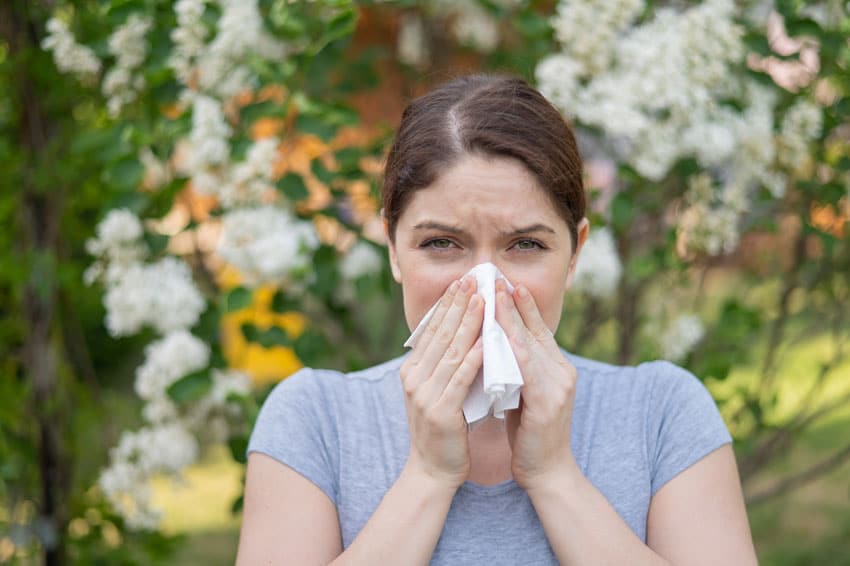Snoring can not only disrupt your sleep, it can lead to health risks. So for your peace of mind, and peace of night for everyone else in the house, it’s important to consider how you might address snoring.
One potential cause of snoring is allergies. In Omaha we have a variable climate that gives us distinct seasons. Unfortunately, this also produces allergies pretty much year round. In fact, Omaha has been named one of the country’s allergy capitals. Here’s what you can do to help combat allergy-related snoring.

What Are Allergies?
Allergies are when your body reacts to substances as if they carry a risk of infection. The immune system behaves as it does when you are exposed to viruses or harmful bacteria.
When exposed to allergies, you might experience cold and flu-like symptoms including:
- Red, itchy, watery eyes
- Nasal congestion and discharge (stuffy and runny nose)
- Body aches
- Sneezing
- Swelling
Most often, allergic reactions trigger minor, cold-like symptoms. However, sometimes an allergic reaction can be serious, even life-threatening. Seek emergency care if an allergic reaction leads to chest tightness, nausea and vomiting, or difficulty breathing.
How Allergies Contribute to Snoring
Snoring occurs when your airway is not large enough to easily accommodate your breathing while you sleep. This causes turbulent airflow that causes the airway to vibrate. This vibration creates the sound you hear as snoring.
Allergies can lead to narrowing of the airway in two main ways: swelling and congestion. When the tissues of your airway swell, it causes the airway itself to narrow, which can restrict airflow. In addition, the immune response to allergens often includes the production of additional mucus, causing congestion.
Allergy Seasons in Omaha
Omaha’s environment is ideal for many different types of plants, which means that it has several very heavy allergy seasons.
The spring allergy season can start as early as February, with trees like cedar, maple, and elm. Tree allergy season peaks in March and April, but can extend through May and even into June.
Grasses typically start producing pollen in April or May, and extend through the summer.
Weeds can start producing allergens along with grasses, but many of the worst allergens begin in July and extend through the fall. Ragweed is a common source of Allergies, and it peaks around Labor Day.
Fungal spores can be high at any time during the warmer months, especially after a rainstorm.
Indoor Allergies
In addition to allergens spreading in nature, there are many allergens in the home that might contribute to your snoring.
Dust and dust mites are among the most common allergens in the house, but there might also be fungal spores, and you might have an allergic reaction to some types of cleaning products.
Pet dander and cigarette smoke can also be common sources of allergies and airway irritation that lead to snoring.

Reducing the Impact of Allergies
If you want to keep your snoring under control, you might try to reduce the impact of your allergies. There are several strategies that can help. These include:
- Avoid going out on high-allergen days
- Wear a face mask
- Take antihistamines
- Clean your indoor environment
- Use a humidifier
- Use an air filter
One way to reduce your allergic exposure is to just not go outside when there’s a lot of pollen in the air. Figure out the pollens that trigger your allergies, learn their seasons, and watch the pollen count (more on this later).
If you can’t just stay home through allergy season (most of us can’t), you can try to reduce your exposure by wearing a face mask when you go outside. As a side effect of COVID, you probably have some of these around. Surgical masks are effective enough to protect from pollen, and N95 masks work as well. When you come indoors, either throw the mask in the trash or put it in a plastic bag to avoid spreading allergens inside.
When you start to experience allergic reactions, take an antihistamine. Histamines are the signal your body uses to trigger allergic reactions, so blocking them will help control your symptoms.
Cleaning indoor surfaces regularly will help you avoid exposure to all allergens, especially those that generate indoors. Omaha is normally humid enough through the summer that a humidifier isn’t normally necessary. However, if you are running the air conditioner constantly, it removes moisture from the air, so you might consider adding some moisture back in.
Finally, filtering the air indoors can cut down on the amount of allergens in the air.

Understand the Pollen Count and Allergy Forecast
You can help protect yourself from allergens by paying attention to pollen counts. There are many of them available, including this pollen count from the Asthma & Allergy Center in Bellevue. The pollen count is a specific measurement of the actual pollen levels in the air.
As you can see, although it’s helpful in telling you whether grass, weeds, trees, and fungal spores are high or low, it doesn’t tell you what types of plants are releasing pollen. Once you know what pollens trigger your allergies, research the specific plants. Find out when they release pollen. Be on the alert for high pollen days during these times.
A pollen or allergy forecast is an estimate of what pollen levels are expected to be like in the future. They can help you plan, but, like weather forecasts, they can be inaccurate.
Effective Snoring Treatment with Allergies and More
Allergies are just one potential cause of snoring. Even if you do your best to avoid exposure to allergens, you might still experience snoring.
At the Advanced Dental Sleep Treatment Center, our sleep dentists offer effective snoring treatment that can help control snoring, even when your allergies flare up. To learn whether our treatment options can help you, please call (402) 493-4175 or use our online form to request an appointment today.
